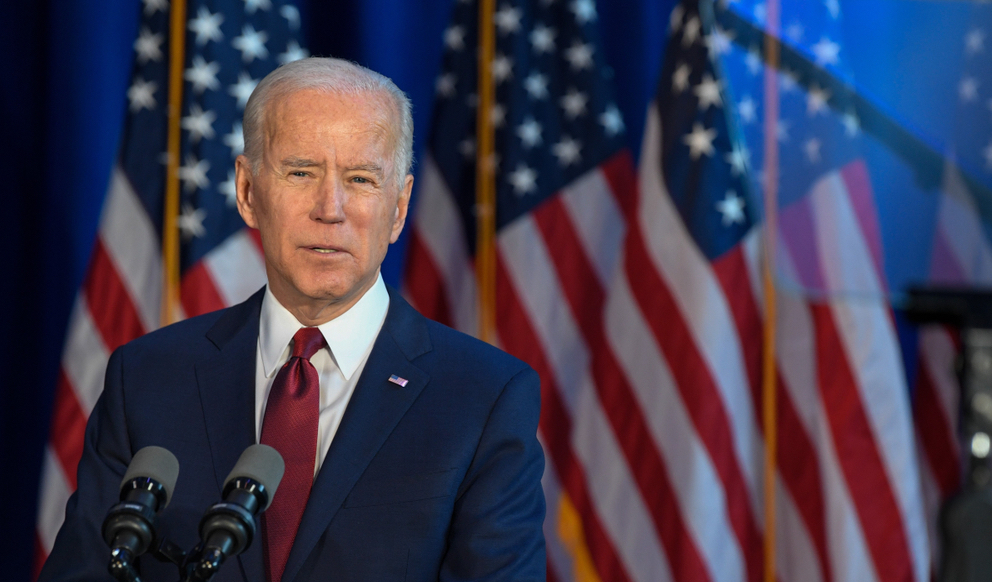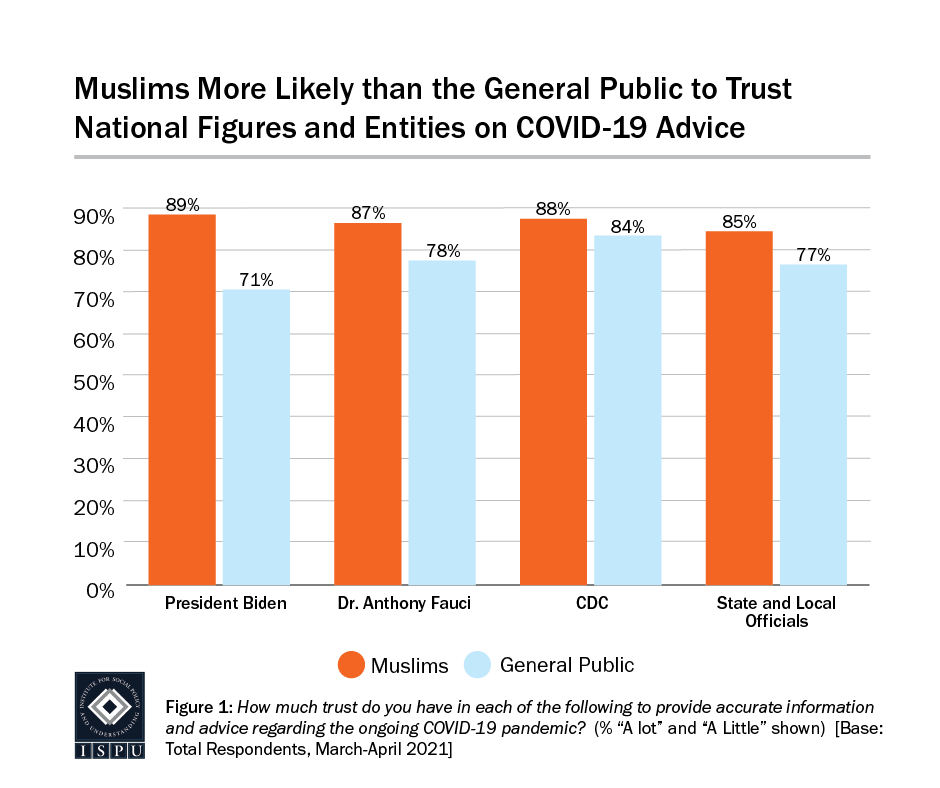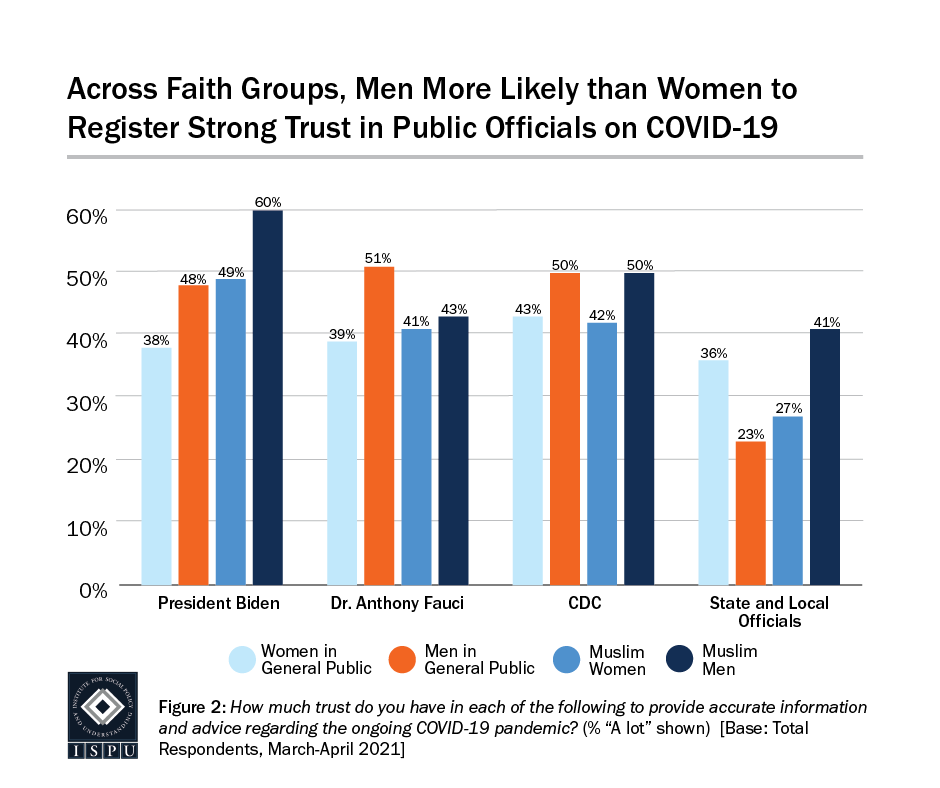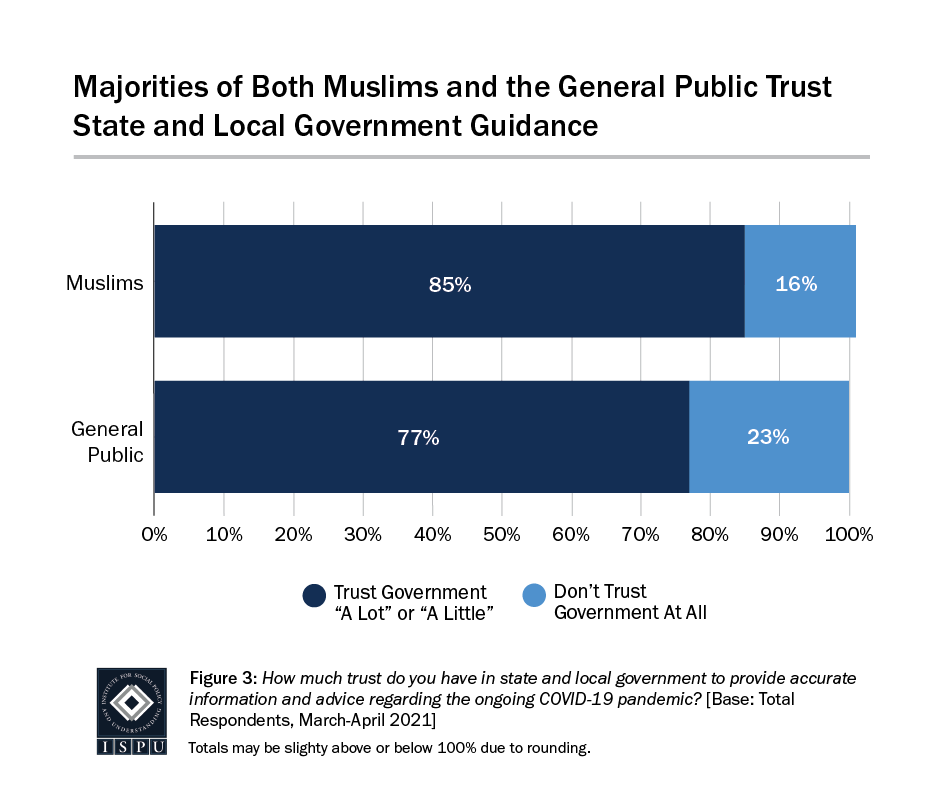
Muslims Show More Trust in Public Officials’ Guidance on COVID-19
January 19, 2022 | BY KATHERINE COPLEN
SUMMARY
Despite experiencing high levels of structural discrimination, Muslims are more likely than the general public to trust public officials and governmental entities to provide accurate information and advice regarding COVID-19.
The months since the first COVID-19 case emerged in America have included two presidencies, a heated election season, and an invasion at the Capitol by right-wing extremists, all amid the background of conflicting and oft-changing guidance and recommendations from the Centers for Disease Control (CDC) and the World Health Organization (WHO) and evolving and conflicting restrictions and rollbacks from local, state, and federal government officials.
In an effort to better understand attitudes during this tumultuous time, The Institute for Social Policy and Understanding (ISPU) fielded a survey exploring attitudes related to trust in public officials among American Muslims and the general American public. Fielded between March and April 2021, these findings reflect attitudes a year into the pandemic, on the heels of a COVID wave, a few months into a new presidency, before vaccines became widely available and states and cities were on widely varying levels of lockdown. The full survey methodology is available here.

Muslims Show More Trust in Public Officials’ Guidance on COVID-19
January 19, 2022 | BY KATHERINE COPLEN
SUMMARY
Despite experiencing high levels of structural discrimination, Muslims are more likely than the general public to trust public officials and governmental entities to provide accurate information and advice regarding COVID-19.
The months since the first COVID-19 case emerged in America have included two presidencies, a heated election season, and an invasion at the Capitol by right-wing extremists, all amid the background of conflicting and oft-changing guidance and recommendations from the Centers for Disease Control (CDC) and the World Health Organization (WHO) and evolving and conflicting restrictions and rollbacks from local, state, and federal government officials.
In an effort to better understand attitudes during this tumultuous time, The Institute for Social Policy and Understanding (ISPU) fielded a survey exploring attitudes related to trust in public officials among American Muslims and the general American public. Fielded between March and April 2021, these findings reflect attitudes a year into the pandemic, on the heels of a COVID wave, a few months into a new presidency, before vaccines became widely available and states and cities were on widely varying levels of lockdown. The full survey methodology is available here.
In Spring 2021, Muslims Were More Likely than the General Public to Trust National Figures and Entities Like President Biden, Dr. Anthony Fauci, and the Centers for Disease Control (CDC)
When ISPU’s survey was fielded, President Biden was just a few months into his term. We found that 54 percent of Muslims indicated they trusted Biden to provide accurate information and advice regarding the ongoing COVID-19 pandemic “a lot,” versus 43% of the general public. This tracks with understanding of Muslim political attitudes and other trends. Pew Research shows in their tracking of trust in public officials that since the 1970s, trust in government has been consistently higher among members of the party that controls the White House than among the opposition party. In ISPU’s 2020 American Muslim Poll, Muslims had the lowest level of job approval for President Trump of all faith and non-faith groups measured. In our 2020 poll, only 11% of American Muslims identified as Republican, lower than all other groups (17-51%) and on par with the non-affiliated (12%), and a majority considered themselves Democrats (59% versus 42% of the general public).
Older Muslims and Muslim men were the most likely to register strong trust in Biden, with 71% of Muslims aged 50+ (compared with 61% of 30-49 year olds and 39% of 18-29 year olds) and 60% of Muslim men (compared with 49% of Muslim women) responding that they trust Biden’s guidance and advice “a lot.”
This trend follows, but less strongly, for trust in Dr. Anthony Fauci. Dr. Fauci, who serves as director of the National Institute of Allergy and Infectious Diseases (NIAID) and the Chief Medical Advisor to President Biden has become a flashpoint figure as pandemic response and guidance increasingly became politicized. In ISPU’s survey, the general public is more likely to not trust Fauci at all (21.8% of the general public vs. 13.4% of Muslims), although men and older Americans are more likely to register strong trust. Similar levels of Muslims and the general public report “a lot” of trust in Fauci, with 45% of the general public and 42% of Muslims registering strong trust.
The Centers for Disease Control and Prevention, the United States’ national public health agency tasked with issuing public health guidance, is also broadly trusted by both the general public and Muslims (84% vs. 88%) to provide accurate information and advice. The general public is slightly more likely to not trust the CDC at all (16% vs 12% of Muslims), with 19% of Americans aged 18-49 and 15% of Muslims aged 18-29 and 13% of Muslims aged 30-49 saying they do not trust the CDC at all (compared to 12% of the general public aged 50 and older and 7% of Muslims 50+).
Young Muslims ages 18-29 were less likely than Muslims ages 50 and older to always wear a mask (79% vs. 86%) at the time of ISPU’s survey. Additionally, while Asian (88%), Black (86%) and Arab (83%) Muslims were on par in their use of masks all the time, white Muslims (76%) were less likely than Asian and Black Muslims to always wear a mask. There were no gender differences in mask use among Muslims. We find the same age pattern in the general public, with those aged 50 and older (90%) more likely to wear a mask all the time, compared with 18-29 (70%) and 30-49 year olds (70%). Among the general public, there are no gender or racial differences in mask use.
Men Register Trust in Public Officials More Than Women
Overall, men in the general public registered their trust in public officials and entities more strongly than women, in regard to President Biden (48% of men vs 38% of women registering strong trust), Dr. Fauci (51% of men vs. 39% of women report “a lot” of trust), the CDC (50% of men vs. 43% of women reported “a lot” of trust), and state and local officials (36% vs. 23%). And, perhaps expectedly compared to exit polls from the 2020 election, which showed white Americans made up the majority of voters for former President Donald Trump, 35% of white Americans in our survey answered they did not trust President Biden at all to provide accurate information, compared with 10% of Black Americans and 20% of Hispanic Americans.
This trend broadly tracks with Muslim women and men, with Muslim men more likely to trust public officials in every question tested. That includes President Biden (60% of Muslim men vs. 49% of women registered strong trust), Dr. Fauci (43% of Muslim men vs. 41% of Muslim women), the CDC (50% of Muslim men, vs. 42% of women), and state and local officials (41% of Muslim men vs. 27% of women.) Interestingly, Muslim women are less likely to strongly trust officials in a Democratic administration, but more likely than Muslim men to identify as Democrats (50% of Muslim women vs. 34% of Muslim men, according to ISPU’s 2020 American Muslim Poll).
Majorities of Both Muslims and the General Public Trust State and Local Government, Although that Guidance Has Varied Widely
According to ISPU’s survey, 77% of the general public and 85% of Muslims trust state and local government to issue accurate information and advice about the pandemic. Non-Black Muslims are more likely than Black Muslims to trust their state and local government “a lot” with only 21% giving that answer, vs. 34% of Arab Muslims, 40% of Asian Muslims, and 41% of white Muslims. These findings make sense in light of ISPU’s findings that Muslim women, non-white Muslims, and younger Muslims report higher levels of discrimination.
The general public is more likely than Muslims to not at all trust state and local government (23% vs. 16%), with women in the general public (27%) more likely than men (19%) to say they don’t trust their local officials at all. Similar patterns hold for Muslim women (19% of whom say they don’t trust their local officials at all, compared to just 11% of men). Older members of the general public are more likely to strongly trust their state and local authorities (37% of those in the general public answered that they trust “a lot” vs. 22% and 27% of Americans aged 18-29 and 30-49, respectively). Similarly, older Muslims are also overall more likely to trust local and state government advice, with 17% of Muslims in other age groups registering that they don’t “at all” trust their local officials.
It is notable that Muslims are more likely than the general public to trust government and government agencies, since, as a group, they experience the highest levels of institutional discrimination of any faith and non-faith groups ISPU surveys. ISPU’s 2020 American Muslim Poll survey shows that, for example, 25% of Muslims have experience discrimination while receiving healthcare (25% vs. 5% of Jewish Americans and 5% of the general public).
These findings on trust in public officials are broadly supported by other findings from our survey. Muslims are, for example, less likely than the general public to say mask mandates are an attempt to control people, with four in five Muslims stating their belief that mask mandates are reasonable attempts to protect people. The general public is also more likely to take a “fatalist” view of the COVID outbreak, with 25% of the general public indicating that “an outbreak of this size was inevitable,” compared to 19% of Muslims. ISPU’s survey has revealed that a majority of Muslims in America are working together to combat COVID by taking health and safety measures and trusting government entities.

Katherine Coplen is the Director of Communications at ISPU, where she coordinates media engagement and outreach, assists with the research publication process, and measures ISPU’s impact. She is formerly the editor of Indianapolis-based alt-weekly NUVO Newsweekly, where she oversaw reporting on statehouse politics, music, arts and culture, and environmental affairs. She is a graduate of Indiana University with a BA in English Literature and History.




